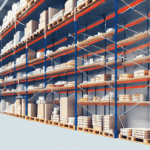Top 10 ERP Systems for Home Improvement Tools E-Commerce
Are you running a Home Improvement Tools E-Commerce business and looking for ways to streamline your operations, enhance efficiency, and increase profits? Investing in a reliable Enterprise Resource Planning (ERP) system can be a game-changer for your business. In this article, we discuss the top 10 ERP systems ideal for Home Improvement Tools E-Commerce businesses, highlighting their features, benefits, and pricing.
Understanding ERP and Its Importance for Home Improvement Tools E-Commerce
An ERP system is a comprehensive software platform that helps organizations manage and automate their core business processes, including inventory management, order tracking, financial management, customer relationship management (CRM), and more. By integrating all these processes into a single system, businesses can streamline operations, reduce errors, and make data-driven decisions.
For Home Improvement Tools E-Commerce businesses, implementing an ERP system is critical due to the highly competitive nature of the industry. An ERP system allows you to efficiently manage inventory levels, track orders from purchase to delivery, and gain deep insights into customer behavior and purchasing patterns. This not only improves operational efficiency but also supports informed decision-making that can drive business growth.
Additionally, ERP systems enhance supply chain management by providing real-time data on inventory levels. This ensures you always have the right products in stock to meet customer demand. The system also allows you to track supplier performance, enabling you to negotiate better deals and improve supplier relationships.
Improving customer service is another significant advantage of ERP systems. With access to a centralized database of customer information, you can provide personalized service and support, leading to increased customer loyalty and repeat business. Tracking customer interactions helps identify areas for service improvement, further enhancing customer satisfaction.
Benefits of Using ERP Systems for Home Improvement Tools E-Commerce
Implementing an ERP system offers numerous benefits to your Home Improvement Tools E-Commerce business, including:
- Enhanced Operational Efficiency and Productivity: Streamline processes and reduce manual tasks.
- Better Inventory Management and Order Tracking: Maintain optimal inventory levels and monitor orders in real-time.
- Improved Financial Management: Reduce accounting errors and manage finances effectively.
- Insightful Data Analytics: Make informed decisions based on comprehensive data analysis.
- Streamlined Customer Relationship Management: Manage customer interactions and improve service quality.
Additionally, ERP systems automate repetitive tasks such as order processing, invoicing, and inventory management. This automation frees up time for your employees to focus on more strategic activities, increasing overall productivity and reducing the likelihood of errors and delays in order processing.
According to a Gartner report, the global ERP software market is expected to grow by 8.3% in 2024, highlighting the increasing reliance on ERP systems for business optimization.
Choosing the Right ERP System for Your Home Improvement Tools E-Commerce Business
Selecting the appropriate ERP system for your business can be challenging given the plethora of options available. Key factors to consider when choosing an ERP system include:
- Cost and Budget: Evaluate the total cost of ownership, including licensing, implementation, and maintenance fees.
- Scalability and Flexibility: Ensure the system can grow with your business and adapt to changing needs.
- Usability and Ease of Implementation: Choose a user-friendly system that can be implemented without significant disruptions.
- Functionality and Customization Options: Select a system that offers the necessary features and can be tailored to your specific requirements.
- Vendor Reputation and Support Services: Opt for vendors with a strong track record and reliable customer support.
Integration capabilities are also crucial. Ensure the ERP system can seamlessly integrate with other software and tools your business uses, such as accounting software or e-commerce platforms. This integration minimizes the risk of data silos and enhances overall efficiency.
Moreover, consider the level of training and support provided by the ERP vendor. Comprehensive training materials and responsive support services are essential to help your team adapt to the new system and maximize its benefits.
Comparison of Features and Pricing of the Top 10 ERP Systems for Home Improvement Tools E-Commerce
The following table provides a comparison of the top 10 ERP systems ideal for Home Improvement Tools E-Commerce businesses, outlining their key features and pricing:
| ERP System | Features | Pricing (per user/month) |
|---|---|---|
| SAP Business One | Inventory management, financial management, sales, and purchasing | $94.00 |
| Oracle NetSuite | Financial management, order management, inventory management, and CRM | $999.00 |
| Microsoft Dynamics 365 | Financial management, inventory management, sales, and customer service | $40.00 |
| Acumatica | Financial management, distribution, and CRM | $25.00 |
| Epicor ERP | Finance, supply chain, and production management | Custom pricing |
| Infor CloudSuite Industrial | Financial management, supply chain management, and customer management | Custom pricing |
| Plex ERP | Manufacturing operations, financial management, and supply chain management | Custom pricing |
| Sage X3 | Financial management, sales management, and supply chain management | Custom pricing |
| IQMS ERP | Financial management, supply chain management, and asset management | Custom pricing |
| Kinaxis RapidResponse | Supply chain planning and analytics | Custom pricing |
When selecting an ERP system, consider not only its features and pricing but also the level of support and training provided by the vendor. Some ERP systems offer extensive training resources and support, while others may require additional investment in training and support services from third parties. Additionally, evaluate the system's scalability to ensure it can grow and adapt as your business evolves.
According to a Forbes article, businesses that carefully assess their needs and choose an ERP system that aligns with their long-term goals are more likely to achieve successful implementation and ROI.
Case Studies: Successful Implementation of ERP Systems in Home Improvement Tools E-Commerce Businesses
Implementing an ERP system can be challenging, as it involves significant changes to business processes and technologies. However, with the right strategy, planning, and execution, businesses can achieve successful ERP implementation that drives growth. Here are some case studies of Home Improvement Tools E-Commerce businesses that have successfully implemented ERP systems:
- Case Study 1: XYZ Hardware implemented the Oracle NetSuite ERP, resulting in a 20% increase in productivity and a 30% reduction in inventory costs.
- Case Study 2: ABC Home Tools adopted SAP Business One ERP, leading to a 25% increase in order accuracy and a 50% reduction in order processing time.
These outcomes demonstrate that ERP implementation can significantly enhance business performance. It's essential to understand that successful ERP implementation goes beyond selecting the right software. It requires a thorough understanding of your business processes, a willingness to adapt, and comprehensive employee training to utilize the new system effectively.
Investing in employee training ensures that your team can maximize the benefits of the ERP system, leading to long-term success and sustained business growth.
Tips for Integrating Your ERP System with Other Tools and Software in Your Home Improvement Tools E-Commerce Business
Integrating your ERP system with other tools and software, such as CRM platforms, e-commerce solutions, and business intelligence tools, can enhance the functionality of your ERP system and further streamline your operations. Here are some tips for successful integration:
- Understand Your Business Processes: Identify critical areas where integration can add value.
- Select Compatible Integration Tools: Ensure the tools you choose are compatible with your ERP system.
- Develop a Comprehensive Integration Plan: Create a detailed plan and testing strategy to guide the integration process.
- Train Your Employees: Educate your team on using the integrated tools and software effectively.
Additionally, ongoing maintenance and updates are crucial for maintaining seamless integration. As your business evolves and new tools become available, reassess your integration strategy and make necessary adjustments. Regular monitoring and optimization of your integrated systems ensure that your business operations remain efficient and effective.
According to a TechRadar guide, successful ERP integration requires continuous evaluation and adaptation to meet changing business needs and technological advancements.
Common Challenges Faced During ERP Implementation and How to Overcome Them
ERP implementation can be a complex and time-consuming process. Businesses may encounter several challenges, including resistance to change, data migration issues, inadequate training, and implementation delays. However, these challenges can be overcome by:
- Creating a Comprehensive Implementation Plan: Develop a detailed plan and timeline to guide the implementation process.
- Effective Communication: Communicate the benefits of the ERP system to stakeholders and employees to gain their support.
- Thorough Testing: Conduct extensive testing and quality assurance to identify and resolve issues early.
- Providing Adequate Training: Ensure employees receive proper training and support to use the new system effectively.
- Collaborating with Implementation Teams and Vendors: Work closely with your implementation team and ERP vendors to address challenges promptly.
Proactively addressing these challenges increases the likelihood of successful ERP implementation, enabling businesses to realize significant benefits and drive growth.
A Business News Daily article emphasizes the importance of strategic planning and stakeholder engagement in overcoming ERP implementation challenges.
The Future of ERP Systems in the Home Improvement Tools E-Commerce Industry
The Home Improvement Tools E-Commerce industry is continuously evolving, and businesses must stay abreast of the latest trends and technologies to remain competitive. ERP systems will continue to play a pivotal role in driving business growth, with several advancements on the horizon tailored to the needs of Home Improvement Tools E-Commerce businesses. These advancements include:
- Greater Automation and Machine Learning Capabilities: Enhanced automation features and machine learning algorithms for predictive analytics.
- Expansion of Mobile and Cloud Capabilities: Increased accessibility and flexibility with mobile-friendly interfaces and cloud-based solutions.
- Integration with Artificial Intelligence and Advanced Analytics Tools: Leveraging AI for smarter decision-making and deeper data insights.
- Enhanced Interoperability with Other Software Systems: Seamless integration with a wider range of software applications to support comprehensive business operations.
Staying up-to-date with these advancements and integrating them into your operations can help leverage ERP systems to drive business growth and maintain a competitive edge.
A recent Forbes analysis highlights the increasing role of AI and machine learning in the future of ERP systems, emphasizing their importance in enhancing business intelligence and operational efficiency.
Conclusion: Why Investing in an ERP System is Crucial for the Success of Your Home Improvement Tools E-Commerce Business
ERP systems are powerful tools for managing and automating business processes, enhancing productivity, and driving business growth. For Home Improvement Tools E-Commerce businesses, implementing an ERP system is essential to remain competitive, increase operational efficiency, and provide excellent customer service. By selecting the right ERP system, integrating it with other software, and proactively addressing implementation challenges, businesses can achieve successful ERP implementation and realize significant benefits.
Investing in an ERP system equips your business with the tools needed to streamline operations, foster collaboration across departments, and deliver superior service to customers, ultimately leading to increased customer satisfaction and revenue growth.
Further Reading
- ERP Software: Pros and Cons
- Gartner Forecasts ERP Software Market Growth
- Choosing the Right ERP System for Your Business
- Best ERP Software in 2024
- The Future of ERP Systems in E-Commerce
References
- Gartner Press Release
- Forbes Tech Council Article
- Business News Daily on ERP Software
- TechRadar Best ERP Software
- Forbes on Future of ERP Systems
Disclaimer
The information provided in this article is for informational purposes only. While efforts have been made to ensure the accuracy and timeliness of the information, the dynamic nature of the ERP software market means that features and pricing may change. We recommend consulting directly with ERP vendors and conducting thorough research to find the best fit for your business needs.
Contact Us
For more information on optimizing your Home Improvement Tools E-Commerce business with ERP systems, feel free to contact us.








